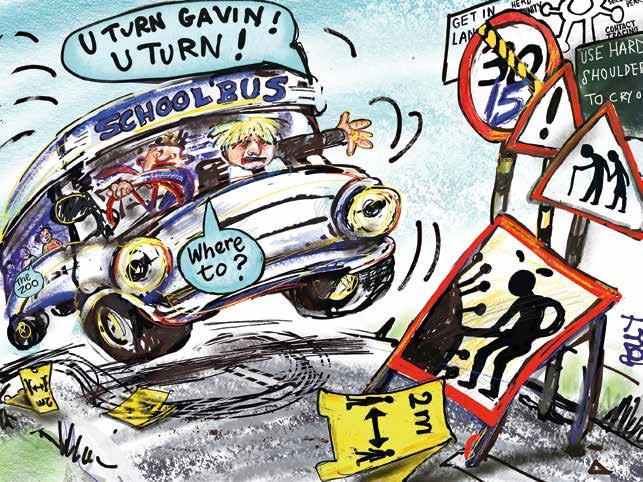Opinion
Cartoon by Polly Donnison
Carry on academising – whatever the cost Warwick Mansell
is a freelance education journalist and founder/writer of educationuncovered. co.uk
IN mid-March, as the Government finally faced up to coronavirus, a host of measures were announced affecting education in England. Schools were closed for all but vulnerable children and those of key workers, and endof-course secondary exams, as well as primary SATs, were cancelled for the year. But on one front it was business as usual. Academy conversions have continued to take place throughout the Covid-19 crisis. On 1 April, less than two weeks after schools were closed to most pupils and as the country tried desperately to flatten its infection curve, 53 institutions saw their control change permanently, as they took on academy status. This is set out in Government data, which also indicates that 19 further schools took on academy status on 1 May. At the time
of writing, a further 557 schools are listed by the Government as still in its pipeline for academy conversion, with 48 of those having specific proposed dates, 11 of them due to become academies this term. With the country going through the biggest challenge to its way of life in decades, and with all those connected with education surely needing a sense of stability, is this really the time to be pressing on with permanent structural changes to schools? I am not alone in asking this question. In April, the Local Government Association (LGA) pressed the Government to pause academisation. It said: “The LGA is concerned that council time is having to be spent on 594 academy conversions [at the time] in the pipeline, which involve the transfer of staff, assets, including land and property, and financial agreements. “This is undermining council efforts to co-ordinate school places for vulnerable children and children of key workers.” The Government, it said, should suspend academisation, as it was “non-essential work”. Sadly, however, this did not happen. The Department for Education said that, while its priority was “the welfare of pupils and staff in the school system” during Covid-19,
academisation would “still proceed where possible, to provide clarity and certainty for schools in the short term”. As a response, this stretches credulity: structural overhauls in the midst of a shutdown surely leave communities with many questions about what, in terms of the detail about the way the institution operates, will change when classes return. In April, Conservative academies minister Baroness Berridge actually allowed a pause to academisation at Moulsecoomb primary in Brighton in the face of a huge campaign involving the NEU. She said in a letter to the local MP that this was because “we wanted to give the school and local authority the space to focus on immediate Covid-19 priorities”. So why press on with academisation in other areas? It seems that, even in the midst of this emergency, Government ideology trumps other considerations. The long-term agenda, of embedding a structure in which control is via private contracts with academy trusts, is simply seen as too important to ministers. I suspect the rigidity of such policymaking reflects wider problems which have undermined the UK’s response as a whole to this emergency, and so cost lives. n see page 17 for more academy news
educate Your magazine from the National Education Union (NEU)
29















